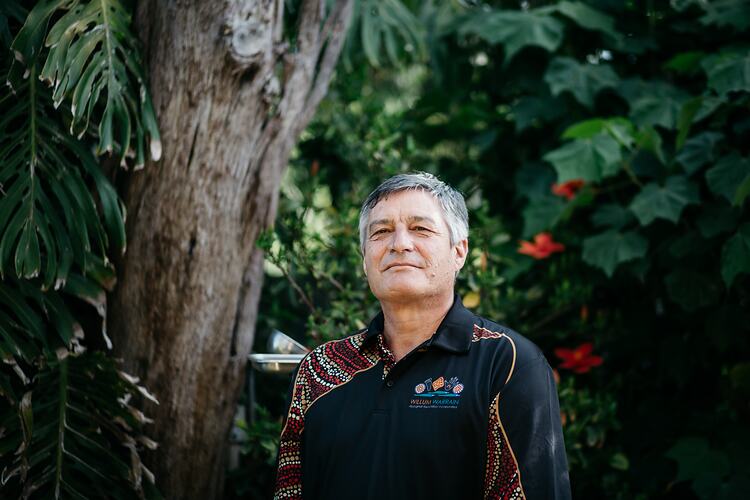Summary
Digital photograph depicting Uncle Peter Armistead standing in Aunty Jennine Armistead's garden in Frankston. He is depicted wearing a Willum Warrain Aboriginal Association T-Shirt. This photograph was taken by Museums Victoria curator Catherine Forge after interviewing Uncle Peter, along with Aunty Jennine Armistead and Anne Benton, about their experience of the COVID-19 pandemic and their involvement with the Willum Warrain Aboriginal Association.
Willum Warrain, which translates to "home by the sea" in the Boon Wurrung language by Westernport, is an Aboriginal Community-controlled organisation that provides a safe cultural space for Aboriginal and Torres Strait Islander people on the Mornington Peninsula. It officially opened in 2014, but had been in the works under various other names and operations since the late eighties. With over 450 Aboriginal members as at December 2020, it provides a range of programs for its Aboriginal community members, including a Women's group, a Men's group, a Deadly Kids group, a Bush Play group (for younger kids and toddlers) a Gardening group (open to non-Indigenous members as well) and a Welcome to Country ceremony for babies. During COVID-19, Willum Warrain was forced to close its' gates and discontinue on-site activities, however the community remained connected via Zoom, phone and community activities such as the provision of food and medicine deliveries to Elders.
Uncle Peter Aldenhoven, proud descendent of the Quandamooka peoples - the Nughi clan from Moorgumpin (Moreton Island, Queensland) - was a founding member of Willum Warrain. In the interview Uncle Peter reflected on his own experience of being adopted, reconnecting with his Aboriginal mother at the age of 34 and later being involved in establishing Willum Warrain as a place of 'hope and healing.' Reflecting on the COVID-19 pandemic, Uncle Peter spoke about the importance of place, community and transmission of cultural knowledge: 'Covid could have cut an absolute swathe through Aboriginal mobs. yet hardly any Aboriginal people got Covid, and that's because we took care of each other and we really listened to the messaging. And because we've got this sharing sort of dimension, you know, I think it was a good warning, and then the other element I think of us caring for each other in a collective fashion, that was really important.'
Physical Description
Born digital photograph, TIFF format.
Significance
This is one of a series photographs that were taken by curator Catherine Forge to document the story of Aunty Jennine Armistead and her wider connection to the Willum Warrain Aboriginal Association during COVID-19. These photographs are accompanied by an oral history interview and several items that were donated by Aunty Jennine Armistead including: 2 x handwoven baskets, a handwritten diary entry and a Willum Warrain 'Black and Deadly' T-Shirt. These were all collected with support from the Office for Suburban Development for the Museums in My Neighbourhood Project and digital exhibition, and now form part of Museums Victoria's Collecting the Curve: COVID-19 Pandemic Collection.
This collection of Willum Warrain items represent a wide range of COVID-19 related storylines including: daily life during lockdown, local neighbourhood connections, gardening, kindness and gift giving, and the emergence of new neighbourhood traditions. These items also symbolise and reflect a deeper story of First Peoples cultural knowledge and community connection, including storylines around truth telling, Stolen Generations, resilience, solidarity and intergenerational cultural exchange. These items will provide a lasting reminder of the community support activities of Willum Warrain members during COVID-19, as well as the importance of place, connection to Country and the vital role of First Peoples cultural knowledge and customs during the COVID-19 pandemic, and always.
More Information
-
Collection Names
-
Collecting Areas
-
Acquisition Information
Field collection from Aunty Jennine S. Armistead - Willum Warrain Aboriginal Association Incorporated, Uncle Peter Aldenhoven - Willum Warrain Aboriginal Association, Catherine Forge - Museums Victoria
-
Acknowledgement
Collected as part of the Museum In My Neighbourhood project with support from the Office of Suburban Development
-
Place & Date Depicted
-
Photographer
-
Person Depicted
Uncle Peter Aldenhoven - Willum Warrain Aboriginal Association
-
Organisation Named
-
Format
Digital file
-
Classification
-
Category
-
Discipline
-
Type of item
-
Keywords
COVID-19 Pandemic, Pandemics, Aboriginal History, Communities, Isolation, Indigenous Cultures, Indigenous Peoples, Gardens, Plants, Homes
